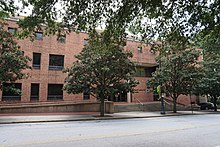King Center for Nonviolent Social Change
 | |
 | |
| Founded | 1968 |
|---|---|
| Founder | Coretta Scott King |
| Focus | Nonviolent Social Change |
| Location | |
President | Bernice King |
| Website | thekingcenter |
The Martin Luther King Jr. Center for Nonviolent Social Change, commonly known as The King Center, is a nongovernmental, not-for-profit organization in Atlanta, United States.
History
[edit]The center was founded in 1968 by Coretta Scott King,[1] who started the organization in the basement of the couple's home in the year following the assassination of her husband in 1968.
In 1981, the center's headquarters were moved into the Martin Luther King Jr. National Historical Park facility on Auburn Avenue which includes King's birth home and the Ebenezer Baptist Church, where he preached from 1960 until his death.[2]
In 1977, a memorial tomb was dedicated, and the remains of Martin Luther King Jr. were moved from South View Cemetery to the plaza that is nestled between the center and the church. Martin Luther King Jr.'s gravesite and a reflecting pool are also located next to Freedom Hall. Mrs. King was interred with her husband on February 7, 2006.
In 1994, Dexter King succeeded his mother as director of the center.[3] In 2010, Martin Luther King III became president. [4]In 2012, King's youngest child, Bernice King, became the CEO.[5]

Programs
[edit]The center provides research, education and training programs on the principles, philosophy and methods of non-violence.[6] It supports these actions internationally with the Beloved Community Network.
Martin Luther King Jr. Nonviolent Peace Prize
[edit]The Martin Luther King Jr. Nonviolent Peace Prize is awarded by the King Center.[7]
A non-exhaustive list of recipients includes: Cesar Chavez (1973); Stanley Levison and Kenneth Kaunda (1978); Rosa Parks (1980); Martin Luther King Sr. and Richard Attenborough (1983); Corazon Aquino (1987); Mikhail Gorbachev (1991); and, on April 4, 2018 – the 50th anniversary of King's assassination – Ben Ferencz and Bryan Stevenson.[7][8]
References
[edit]- ^ Gary L. Anderson, Kathryn G. Herr, Encyclopedia of Activism and Social Justice, SAGE Publications, USA, 2007, p. 804
- ^ Paul Finkelman, Encyclopedia of African American History: 5-Volume Set, Oxford University Press USA, USA, 2009, p. 97
- ^ Ronald Smothers (October 23, 1994). "Son of Slain Civil Rights Leader Succeeds Mother as Head of Group". nytimes.com.
- ^ Marcus K Garner (April 7, 2010). "King children reconcile over King Center".
- ^ BJ, Bernice King named King Center CEO, bizjournals.com, USA, January 9, 2012
- ^ "WHAT WE DO". The King Center. Retrieved June 5, 2023.
- ^ a b Umontuen, Itoro (2018-04-04). "The King Center honors 2018 Martin Luther King Jr. Nonviolent Peace Prize recipients". The Atlanta Voice. Retrieved 2020-08-27.
- ^ "Commemorative Services". The King Center. Archived from the original on 2018-12-29. Retrieved 2020-08-27.
External links
[edit]- 1968 establishments in Georgia (U.S. state)
- Civil rights movement museums
- Coretta Scott King
- Martin Luther King Jr. National Historic Site and Preservation District
- Memorials to Martin Luther King Jr.
- Monuments and memorials in Georgia (U.S. state)
- Non-profit organizations based in Georgia (U.S. state)
- Nonviolence organizations based in the United States
- Old Fourth Ward
- Organizations based in Atlanta
